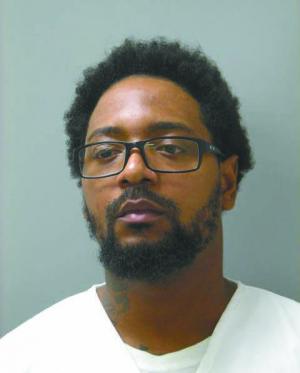Trial again underway in 2014 double homicide
Witnesses described a night of hard drugs and little sleep leading up to the murder of two Millsboro men in January 2014.
Steve Kellam, 36, is the third and last man to stand trial in the deaths of Cletis Nelson and William Hopkins, whose bodies were found riddled by bullets in a Harmons Hill Road home.
Kellam faces first-degree murder, robbery, home invasion and racketeering charges for his role in the murders, and he is also accused of conspiring to facilitate two separate home invasions in December 2014.
In his opening statement Sept. 6, prosecutor Chris Hutchison told the jury in Sussex County Superior Court that Kellam ran robberies like a military general. Kellam scouted, planned and gave the orders in a scheme to rob drug dealers of cash and narcotics. His foot soldiers were a web of family members who could be counted on not to talk to police, Hutchison said.
In Kellam's defense, attorney Patrick Collins said there is little in the way of forensic evidence and the case will come down to witness credibility. The prosecution’s witness list includes murderers, drug addicts and prostitutes, all of whom have cut plea deals with the state and are looking to get out of long jail sentences, Collins said.
Taking the stand Sept. 6 was Rachel Rentoul, 32, a prostitute and heroin addict who is now serving 15 years for her role in the robbery that resulted in the murders of Nelson and Hopkins. Rentoul said she thought she had an exclusive relationship with Nelson, and she became upset when she saw texts from another woman on his phone. She also said many men called her throughout the day back then, offering to pay her for sex.
After she left Nelson's home, Rentoul said she spent a weekend that swirled around cocaine, heroin and clients. She said she rarely slept, maybe eight hours a week. Doing heroin and smoking crack kept her awake so that she wouldn't fall asleep and wake up dope sick.
That weekend, she said, her hours were spent driving back and forth between a Long Neck motel, where she and friend Jacqueline Heverin met clients, and Nelson's Harmons Hill Road home, where she stopped four times to buy heroin with money they earned.
“Even if you were in a fight, you could still dial him up and get a bundle?” asked defense attorney Patrick Collins, using a street term for a quantity of heroin.
“Yes I could,” Rentoul responded.
At one point, Rentoul said, a group of men including Kellam showed up at the motel, and she told them Nelson and Hopkins had thousands of dollars. They discussed robbing the two men, and she led the group to the Harmons Hill Road on one of her drug buys. “I showed them where it was,” she said.
Rentoul testified she never heard any discussion of guns or plans to shoot and kill Nelson and Hopkins. Heverin, who testified Sept. 7, also said there was no talk about guns at the motel. She said Rentoul did most of the planning for the robbery with the group, and the younger guys – Stratton and Waples – were enthusiastic about committing the robbery, contradicting the prosecution's case that Kellam was the mastermind of everything.
Weeks after the murders, Rentoul said she saw Kellam at a mutual friend's home in Millsboro, and they spoke. “He told me to keep my mouth shut,” Rentoul said.
Also testifying Sept. 6 was Edward Cannon, released from prison Sept. 1, who said Nelson was a friend. Cannon said he had walked away from a work-release program, but he was working for a demolition company and for another company that fixes up rental units. He said he knew Nelson and Hopkins were selling heroin, but he didn't want drugs in the home. “We were trying to fix up the house and be home,” he said.
Work slowed down, Cannon said, and he started selling heroin to bring in extra money. The night of the murders, he said, he was upset because he lost his wallet with $5,800 in drug money, but Nelson seemed to understand. “He wasn't that upset about it,” he said.
Cannon then described how he spent his hours leading up to his discovery of the bodies. Leaving his home at 11 p.m. to get a haircut at his friend's home in Rehoboth Shores, Cannon said, he wore pajamas because he thought he would come back home to sleep. But that didn't happen; he instead ended up doing cocaine and then going to a friend's home in Millsboro. “I just wanted to get a haircut and go to sleep,” he said.
When he finally got a ride home, he said, he thought it was weird that the back screen door was swinging open. “I thought those jokers were letting the heat out. It was 5 degrees outside,” he said.
Inside, Cannon said, he saw Nelson lying on the floor and Hopkins in a chair, but they looked like they were asleep. Then, he saw the blood and smelled gunpowder, and he knew something was wrong.
“Nobody moved. Nobody said nothing,” he said. He stepped on a bullet casing and saw a flash out of the corner of his eye – probably a television left on in a backroom – but by then he was in flight mode.
“I thought, 'Oh, f***. Somebody shot my boy,'” he said.
Cannon went to another friend's house but then returned to the trailer to get his clothes. He said he remembers being worried about getting rid of a marijuana blunt, so that the home wouldn't look like a drug house. Police who testified said they found bags of heroin stashed in a McDonald’s Chicken McNuggets box and a cell phone box tucked into cinderblocks next to an outside shed.
“I didn't want it to blow up on my family. On my way out, I said a little prayer for Clete and Hop,” he said.
The bodies of Nelson and Hopkins were eventually found by Nelson's brother, who called police.
Cannon headed to Delmar where police eventually arrested him. He was in prison for three years, nine months, but is now out on home confinement with an ankle bracelet to track his whereabouts.
“I feel better, but I'm not free,” he said.
More robberies
Six men were charged in the murders of Nelson and Hopkins. Rhamir Waples, 17 at the time of the murders, was found guilty of first-degree murder and was sentenced to life in prison; Damon Bethea was found not guilty; and Shamir Stratton and Richard Robinson took plea deals agreeing to testify. Carlton Gibbs took a plea and was released, after officials said he had little to do with the murders.
In his opening statements, prosecutor Hutchison said Robinson, Waples, Stratton and Bethea are Kellam's cousins who he brought from Philadelphia and New Jersey, ostensibly to attend a party but in reality to “do licks,” or commit robberies. Bethea was found not guilty; he testified he never intended to take part in a robbery, and only came to Sussex County for a party. He also said he never entered the trailer on Harmons Hill Road, but stayed outside and then walked away along the roadway until someone picked him up later.
Hutchison said the robbery of Nelson and Hopkins was the group's first, but Kellam set up other robberies with some of the same participants.
Eleven months after the murders, Hutchison said, Kellam called Robinson and Waples back to Sussex County for a robbery and home invasion of a drug dealer named Milton “Fat Dice” Laughlin. Kellam gave guns to Robinson, Waples and a third man involved in the robbery named B-Hop, Hutchison said, and showed them where the house was. He said the trio entered the house and found Fat Dice and a woman named Connie Stewart. Hutchison said Fat Dice did not have any cash and the trio left.
Three days later, Hutchison said, Kellam plotted the robbery and home invasion of Azell Foster. This time, Hutchison said, Robinson, Waples and B-Hop were joined by a fourth, unidentified man. With only three guns, Hutchison said, Kellam called in an acquaintance named Jackson Vanvorst to procure a fourth gun. Hutchison said Kellam told the four robbers that Foster would be armed and that they should yell “police!” when they entered the house so he wouldn’t quickly reach for his gun. But when they broke in, Foster didn’t buy the ruse, and a shootout ensued. Foster was wounded, but one of the guns used in the robbery, a .32-caliber revolver, was left at the scene, Hutchison said.
While Hutchison admitted that Kellam never went into any of the houses, he said Kellam got the weapons, scouted the places to be robbed and gave the orders, orders that were faithfully followed.
EDITOR’S NOTE: This story has been updated.
RELATED STORY »
Nelson and Hopkins murdered in Sussex
























































